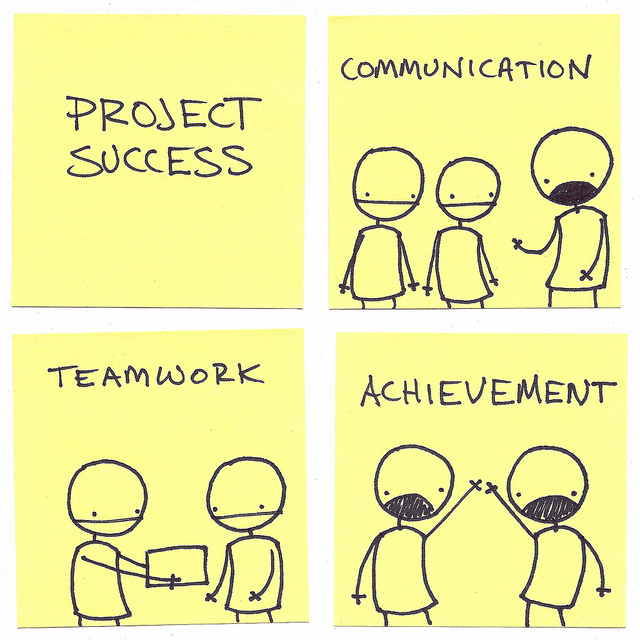via: Ken Fager
The best endorsements of performance are typically word of mouth.
A success story about a successful implementation seizes verbal recommendations and sets them in stone.
Suppose a customer speaks highly of your company to 10 others. That same endorsement in a success story recommends you to hundreds of others in a direct mail campaign and thousands more when it is posted on the web or when it appears in the news media.
Success stories prove you’ve delivered such a highly valued service that you’ve transformed a customer into an advocate who is willing to speak out on your behalf. Launch a more aggressive success story program by first asking:
1. Are success stories right for us?
Success stories reap dividends for companies offering complex products or services. Most prospects become confused when comparing your products or services feature-by-feature with competitors. A success story helps rectify that and can become a deciding factor in helping prospects choose your solution over others because it “shows” rather than “tells” about your capabilities. Success stories deserve a prominent position in your marketing mix. Success stories are your personal reference stories. They show tangible business benefits you’ve delivered and describe how your customer profits or saves from them. Success stories are “real world,” telling prospects what makes you stand out by sharing positive experiences with your products and services.
2. Can we get permission to “name names” of clients?
You earn the best business value when you’re permitted to use your customers’ names in success stories. Some companies successfully weave promotional clauses citing success stories into sales agreement language.
Often, marquee-name customers are the most uncooperative in granting permission to link their success to you. The result is that hundreds of otherwise well-researched, well-written success stories wind up as a “poor man’s version,” in which the name of the endorsing customer is Generalized (for example, “a large subsidiary of a Fortune 500 company.”)
A success story without a name behind the endorsement is like an Indianapolis race car with its fuel gauge on empty. If you want your success story to genuinely impress a prospect, it has to make real noise by naming names. How do you get satisfied customers to cooperate? It’s a two-step process.
It starts at the beginning of your relationship.
- Ensure that mutually beneficial promotional clauses are woven into sales agreements.
- Participate in sales meetings and listen for stories of satisfied customers. Then, follow up with the sales lead after the meeting.
- Be upfront about your company’s interest in success stories by formalizing a client reference program.
- Ask your sales team about customers they know who value public exposure. Making a client a champion because of their passionate or smart use of your solutions is a great way to garner a lifelong fan.
- Be your own success story. Many clients do this when they are just getting started. If you are using the technology or service you are selling, interview your CTO or operations leader to show how you are generating ROI by implementing your own solutions.
- Give an award or nominate exemplary customers for an industry award, so the story becomes more about touting them.
- Record your experts and customers when they speak at trade shows or to analysts, and then transcribe their success into a story.
Seek approval beyond the “first contact” levels. Permission must be granted from other corporate departments in your customer’s organization—perhaps in corporate headquarters, such as a chief marketing officer or general counsel —which may have policies pertaining to success stories.
Companies should lean on experts who have experience in successfully overcoming these hurdles. Following that, be certain that you conduct a professional success story approval process with customers.
3. Is now the right time to suggest doing a success story?
It’s possible to time your suggestion of writing a success story to a peaking service-level agreement and satisfaction level. Your customer should have had enough time to see accrued benefits—and ideally be able to quantify them. All satisfied customers should be considered potential success story candidates.
Why do longer-standing customers deserve a look? Such customers can be some of the most convincing to a prospect. A company’s ability to state that it has developed a long-term relationship with a customer, and that customer’s willingness to state that it continues to be highly satisfied with the work done, is a powerful one-two punch.
4. What is the ideal length of a success story?
Whenever use of the full content of a success story is ensured and fully controlled—such as one to appear on your website—a story ranging between 400 and 1000 words is satisfactory. If your sales are complex, a success story falling short of 600 words might skimp on important business benefits that most decision makers would appreciate reading. Most often, the length of a success story comes into question whenever the story is submitted to the news media for editorial consideration. If editors feel that more content is required, they will pursue it. Keep in mind that although you may think you have a strong, 800- word success story loaded with powerful problem-solution-result content, editors reserve the right to reject or edit any story.
Success stories can be some of your most powerful selling tools. Approved fully, planned carefully, written expertly, and merchandised effectively, these tools help substantiate your value and close sales.
—
Mary Conley Eggert is President of Tech Image, a national, award-winning digital PR agency that uses the latest strategies and technologies to help clients tell their stories more efficiently and effectively. Mary earned her MBA from Northwestern University’s Kellogg School of Management and is an Executive Committee member of the PRSA Technology Section. You can find Mary on Twitter @maryeggert and LinkedIn.







